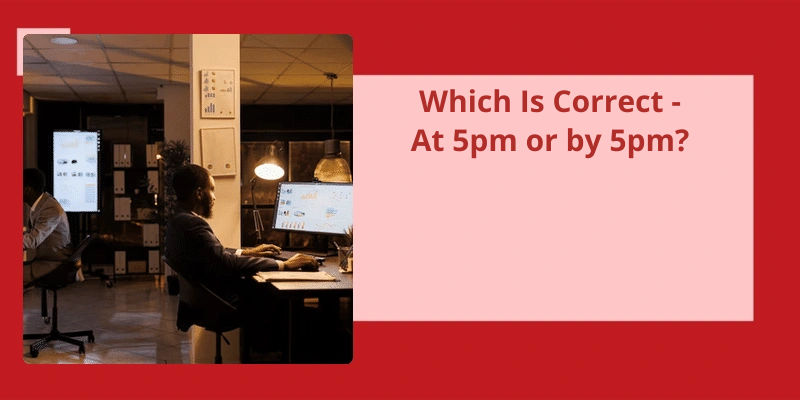The English language is full of nuances and subtleties, making it a challenging language to master. One such subtlety is the use of prepositions in reference to time. The difference between using "at," "in," "on," and "by" can often be confusing, especially when it comes to specifying a particular time. Understanding these small but important differences can make a big impact on how effectively we communicate in business and everyday life.
What Is the Meaning of by 5pm?
By 5:00 pm refers to a specific deadline or endpoint for an activity. This can be a deadline for submission of work, or an appointment with a client. The term by is often used to indicate the end point of a task or activity, and denotes the time by which a particular task or activity must be completed. It serves as a reminder of the importance of meeting deadlines and being punctual.
For example, in the business world, it may be used to indicate the deadline for a report to be submitted, or for an invoice to be paid. In other settings, it may indicate the deadline for a project to be completed, or the time by which a package must be sent out for delivery. This use of by helps establish clear expectations and guidelines for when a task must be completed.
For example, a conference may be scheduled to end by 5:00 pm on the final day, meaning that attendees should be ready to leave at this time. In this context, by is used to indicate the time that the event will officially end.
It’s a common phrase used in a variety of different settings, and helps ensure that everyone involved understands the timeframe for completion. Being aware of the meaning of by can help individuals and organizations stay organized and meet their deadlines punctually.
Which Is Correct by 8 Am or at 8 Am?
The phrase “by 8am” means that the meeting should take place no later than 8am. This implies that there’s a set ending time to the meeting or activity that follows.
It’s essential to clarify which option works best for your specific meeting or activity. If it’s an early morning meeting, setting a precise start time may be more effective to keep everyone on time. However, if your activity is more flexible with the timing, using “by 8am” may be more apropos, and it gives a leeway of a few minutes.
Likewise, using one phrase over the other can also affect expectations on punctuality for the attendees. “At 8am” indicates that the host is expecting on-time presence and no tolerance for late-comers.
In the same vein, the method and means of communication also play an instrumental role in determining which phrase is appropriate. For instance, if sending an email or text message, it may be better to use “at 8am,” which is clearer and concise. However, if conveying the message verbally, it may be more effective to use “by 8am” to avoid causing awkwardness or tension amongst the attendees.
Providing Examples of Situations Where “By 8am” or “At 8am” May Be More Appropriate
- When referring to a work event such as a meeting or deadline
- When talking about an appointment with a dentist, doctor, or other healthcare provider
- When discussing a school start time or project deadline
- When scheduling a transportation pick-up or drop-off
- When mentioning a restaurant reservation or event start time
When it comes to time, the words ‘at’ and ‘by’ may seem interchangeable, but in reality, they carry different meanings. While ‘at 3 pm’ indicates a specific time, ‘by 3 pm’ implies an earlier deadline or completion time. Understanding the nuances of these time markers can be crucial in ensuring clear communication and meeting deadlines.
What Does by 3pm Mean?
When someone says, by 3 pm, it’s generally understood as a deadline for completing a task or meeting a commitment. For example, if you tell your friend that you’ll meet them for lunch by 3 pm, then it implies that you won’t be late than 3 pm. In business meetings or work-related scenarios, it conveys a sense of urgency as everyone knows that the deadline must be met to avoid any delays or issues.
In some cases, the phrase by 3 pm can have legal implications as well. For example, in court cases, if a defendant is required to appear by 3 pm, then failing to do so could result in significant consequences. Hence, it emphasizes the importance of punctuality and respecting deadlines.
Overall, by 3 pm holds a lot of meaning and significance, and it helps convey a sense of urgency and importance in various settings. It helps keep individuals accountable, ensures that deadlines are met, and makes communication more clear and precise.
Correct usage of prepositions is crucial in any language, especially English, where small changes can make a big difference. One such area is using the prepositions ‘at’ and ‘on’ when talking about time. While ‘on’ can be used for specific dates or days, ‘at’ is used for specific times. This means that when referring to 4 pm, it’s more appropriate to use ‘at’ instead of ‘on,’ as in ‘see you at 4 pm.’ It’s a simple rule, but one that’s worth remembering to avoid any confusion in your communication.
Is It at or on 4pm?
English grammar can be a tricky subject. Many people struggle when it comes to prepositions, and understanding when to use the correct one can be confusing. One of the most common mistakes people make is using the wrong preposition with a time reference. For instance, the phrases “at 4pm” and “on 4pm” have very different meanings, yet they’re often used interchangeably.
You should always use the preposition “at” when referring to a particular time. This is because “at” is a preposition of time, and it specifically denotes a precise moment in time. It’s used to describe a time when something happens or when something is supposed to happen.
You might say, “I’ve an appointment at 2 pm,” or “I need to pick up my kids from school at 3:30 pm.”
On the other hand, the preposition “on” is generally used to indicate a day or date. For example, you might say, “I’ve a meeting on Friday” or “My birthday is on the 14th.”. Using “on” with a time reference is technically incorrect, and it can be confusing for both the speaker and the listener.
Misunderstandings can arise if the speaker and listener aren’t on the same page with what time is being referred to. If youre not sure which preposition to use, it’s always a good idea to double-check and make sure youre using the correct one.
By using “at” with time, you can be confident that your message will be understood as intended.
Understanding how to correctly use prepositions in time-related phrases can be tricky, but it’s important to get it right to accurately communicate a specific time. One common question people ask is whether to say “by 10 am” or “at 10 am.” Each of these phrases conveys a slightly different meaning, so it’s essential to know the difference to avoid confusion.
Is It by 10 Am or at 10 Am?
The difference between “at” and “by” when referring to a specific time can create confusion for some people. The use of “at” indicates that the exact time pointed out is the moment when something happens. For instance, if someone says that a meeting will start at 10 am, it means that the meeting will commence precisely at 10 am. Any slight delay will result in the person arriving late for the meeting.
When planning activities, it’s essential to understand the difference between “at” and “by” so that you can give precise instructions. Making the wrong choice between the two can result in individuals either arriving too late or unnecessarily early for an event. It could lead to unnecessary inconveniences and lost time.
The use of “at” and “by” is critical in various industries, such as aviation and healthcare, where precision is of utmost importance. In aviation, pilots must land their aircraft at particular times to avoid congested airports. Similarly, healthcare providers need to administer medicines precisely at specific times to ensure that patients receive the best outcomes.
While this difference might seem small, it could have severe implications in various fields, and understanding it’s crucial for precise communication.
Understanding how to use prepositions correctly in time expressions can be tricky, especially when it comes to pinpointing a specific time or indicating a more general timeline. In this article, we’ll explore the difference between “by 9 am” and “at 9 am”, as well as discuss the proper usage of “on” with days of the week.
Is It by 9am or at 9am?
As simple as it may sound, there are times when we get confused with several linguistic intricacies, especially when it comes to prepositions. One of the most common cases is when we need to indicate a specific time of day. Is it “by 9 am” or “at 9 am” that we should use? The answer may depend on the context and the nature of the event.
For instance, if you’ve a meeting with your boss at 9 am, and she says that you’ve to submit your report by 9 am, it means that you should have it ready before, say, 8:50 am. “By” is often used to express a deadline or a timeframe within which an action or a task should be completed. For instance, “I’ve to finish my presentation by tomorrow morning.”
If you’ve to attend a webinar or a conference call at 9 am, you’ve to be there exactly at that time. This preposition is often used to indicate a specific moment in time or an appointment. For instance, “I’ve a doctors appointment at 2 pm.”
It’s worth noting that we don’t use the preposition “on” with time of day. Instead, we use it with days. “On Monday” means anytime during the day of Monday. For instance, “Im going to the gym on Monday evening.”. On the other hand, we use “in” with months and other parts of the year. “In June” means anytime during the month of June. For instance, “Im going on vacation in June.”
In some cases, however, the choice between “by” and “at” may be a matter of preference or style. For instance, you may say “Ill be ready by 8 am” or “Ill be ready at 8 am” and both would be correct. However, the former implies that you may be ready before 8 am while the latter refers to the exact moment. In any case, it’s important to consider the context and the purpose of your communication to determine the most appropriate preposition.
If you need to indicate a specific moment in time or an appointment, use “at.”. And remember, use “on” for days of the week and “in” for months and other parts of the year.
Difference Between “By” and “Until” When Indicating a Deadline
“By” refers to a deadline that must be completed before a certain time or date, while “until” refers to a deadline that can be completed up until a certain time or date.”
Source: When to use ‘by’ instead of ‘at’ or ‘on’ to specify time/date?
Conclusion
In conclusion, understanding the subtle differences between the prepositions "at," "in," "on," and "by" can make a significant impact on the clarity and accuracy of our communication. Using "at" in reference to specific times on the clock or points of time in the day, "in" in reference to a period of time, "on" with dates and named days of the week, and "by" with an end point of time to mean no later than, can help prevent confusion and ensure that our messages are conveyed accurately. Being mindful of these nuances can enhance our language skills and improve our ability to communicate effectively in a variety of settings.






